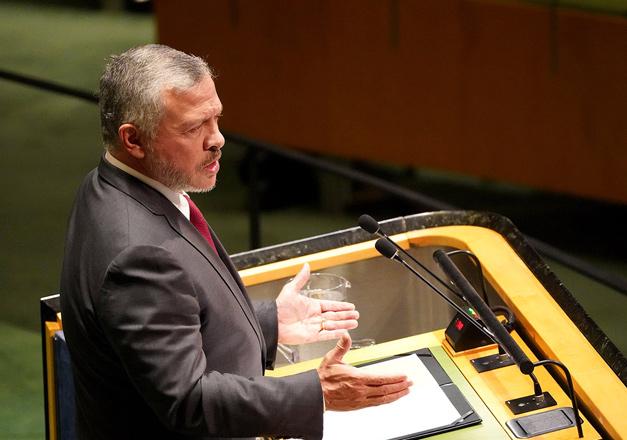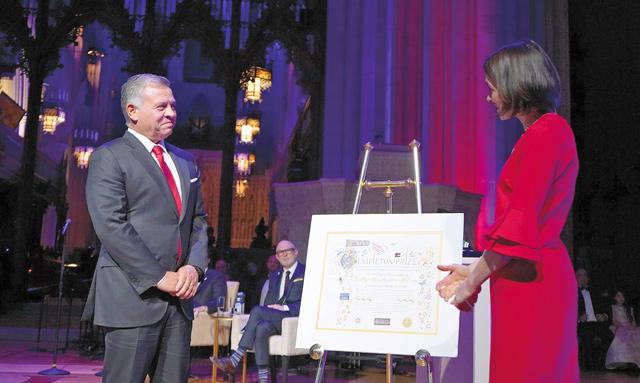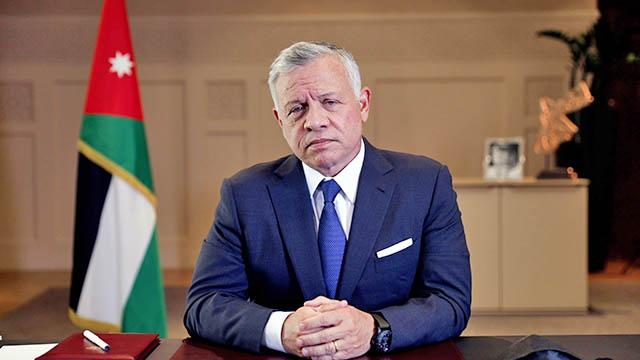You are here
Continued occupation of Palestinian territory a global moral tragedy — King
By JT - Sep 25,2019 - Last updated at Sep 25,2019

His Majesty King Abdullah delivers Jordan’s address at the 74th session of the United Nations General Assembly in New York on Tuesday (Photo courtesy of Royal Court)
AMMAN — His Majesty King Abdullah on Tuesday said the continuation of the occupation of Palestinian territories is a global moral tragedy.
Delivering Jordan’s address at the 74th session of the United Nations General Assembly, King Abdullah said “no occupation, no displacements, no acts of force, can erase people's history, hopes, or rights, or change the true heritage of shared values among the three monotheistic faiths”.
His Majesty stressed that nothing can take away the international rights of the Palestinian people to equality, justice and self-determination, according to a Royal Court statement.
“It is a terrible irony that the land holy to three faiths, faiths which share the great commandment to love one's neighbour, should ever be a place of conflict,” the King said.
“Segregation, forced displacement, violence and mistrust do not belong in this Holy Land,” His Majesty added.
The King called for collective action to end the Palestinian-Israeli conflict.
“The two-state solution is the only genuine solution. Because, what is the alternative? One state, segregated, with unequal laws, dependent on force, betraying the deepest values of the good people on both sides? That is a formula for enduring conflict, not a path to stability, security and peace,” His Majesty said.
“Today, we still urgently need each and every member country to act — to act together with our global neighbours and achieve the better, safer world all of us need,” the King noted.
“What will our future look like, if millions of the world's young people continue to be denied the rich fruits of new technology and global wealth?” His Majesty asked, also urging joint action towards a healthy and safe environment.
“And let's ask ourselves: Why, in the 21st century, are crises still displacing millions of people? Across our world, there are more forced displacements today than at any time since World War II,” the King told heads of states and delegations at the UN.
“What will tomorrow's world look like, if we do not help end these crises and give refugees and hosts alike, the support they need to meet the future?” His Majesty added.
“These are the values that permeate the UN Charter — to live together in peace as good neighbours, to honour the rights and equality of all, to combine our efforts and unite our strengths, not only to maintain peace and security, but to improve human life, through justice, prosperity, and greater hope for humanity,” the King concluded.
Following is His Majesty’s full speech:
“In the name of God, the Compassionate, the Merciful
Mr President,
Mr Secretary General,
Your Excellencies:
This week, leaders from around the world will stand before you, here in this great General Assembly hall, to take part in the 2019 general debate.
We come here in recognition of a simple reality—this General Assembly is vital to meet the dangers and seize the opportunities of our world.
Collective action — this is the promise of the United Nations. Nearly 75 years ago, this organisation was created by the specific, individual actions of member countries, coming together to shape a better future. And today, we still urgently need each and every member country to act — to act together with our global neighbours and achieve the better, safer world all of us need.
For if we do not act, what hope do we have?
What will our future look like, if millions of the world's young people continue to be denied the rich fruits of new technology and global wealth? Can we afford to ignore the crisis of exclusion? Or will we do the right thing, support the energies and talents of all the world's youth and drive all economies forward, through fair and inclusive global growth?
What will our world look like, if we do not work together for a healthy and safe environment? Water-scarce countries like Jordan already know the dangers of climate change. A global crisis demands global action. How can we excuse delay?
And let's ask ourselves: Why, in the 21st century, are crises still displacing millions of people? Across our world, there are more forced displacements today than at any time since World War II. What will tomorrow's world look like, if we do not help end these crises and give refugees and hosts alike, the support they need to meet the future?
And how is it that today, people can still be disrespected and victimised for their faith? Atrocities at mosques, churches, synagogues, and temples have shocked the conscience of the world. But so should the dark, criminal ideas, from across the ideological spectrum, that drive these and other attacks.
Hard work by all of us is needed to defeat these groups and their message of hate and mistrust. But no effort stands a chance unless young men and women everywhere have a stake in a positive future. The forces of violence seek out the vulnerable and excluded. Can we afford to abandon the world's young people to extremism and despair?
My friends,
Collective action is also vital for ending bitter crises and conflicts. And no crisis has done more global damage than the core conflict in my region, the Palestinian-Israeli conflict. Neither side has achieved the durable peace that a secure future depends on, and regional and world stability has continued to pay the price.
It is a terrible irony that the land holy to three faiths, faiths which share the great commandment to love one's neighbour, should ever be a place of conflict. This is the land where prophets walked; the land where generations of Muslims, Christians, and Jews have sought to live in obedience to God, teaching their children compassion, mercy, and respect for others. Segregation, forced displacement, violence, and mistrust do not belong in this Holy Land.
Forty years ago, my father, His Majesty the late King Hussein, who loved peace, stood in this very chamber, and decried the occupation and attempts, in his words, "to eradicate from the world's memory centuries of history and tradition and of spiritual, moral and cultural ideals."
It is a global moral tragedy that the occupation continues. But no occupation, no displacements, no acts of force, can erase people's history, hopes, or rights, or change the true heritage of shared values among the three monotheistic faiths. And nothing can take away the international rights of the Palestinian people to equality, justice and self-determination.
My friends,
Young people ask me, why doesn't the world stand up for Palestinian rights?
Isn't it time to answer them, by showing that global justice and human rights belong to them, too?
It begins with respect for the holy sites and rejecting all attempts to alter the legal status of East Jerusalem and the authentic historic character of the Holy City, Jerusalem. What lessons do we teach young people, when armed personnel enter Al Aqsa Mosque/Al Haram Al Sharif, even as Muslim worshippers gather to pray?
As Hashemite Custodian, I am bound by a special duty to protect Jerusalem's Islamic and Christian holy sites. But all of us have a stake and a moral obligation to uphold religious freedom and human rights. So let us safeguard the Holy City for all humanity, as a unifying city of peace.
We must also press forward towards an end to the conflict, and a just, lasting and durable peace through the realisation of the two state solution — a solution that is in accord with international law and UN resolutions, which provides an end to the conflict and creates a viable, independent, sovereign Palestinian state, on the June 4, 1967 lines, with East Jerusalem as its capital, living side-by-side with Israel, in mutual peace and security.
The two-state solution is the only genuine solution. Because, what is the alternative? One state, segregated, with unequal laws, dependent on force, betraying the deepest values of the good people on both sides? That is a formula for enduring conflict, not a path to stability, security and peace.
My friends,
Tolerance, compassion, and the equality of all human beings—these are the values that make global harmony and collective action possible. And these are the values that permeate the UN Charter—to live together in peace as good neighbours, to honour the rights and equality of all, to combine our efforts and unite our strengths, not only to maintain peace and security, but to improve human life, through justice, prosperity, and greater hope for humanity.
These are the moral obligations that the UN founders set forth. Now they are our responsibility. We must not fail.
May peace and God’s blessings and mercy be upon you.”
Related Articles
AMMAN — His Majesty King Abdullah said that Islam is a religion of holistic vision, "not the cherry-picking of verses to suit a political ag
AMMAN — His Majesty King Abdullah on Thursday delivered an address at “the Middle East and the new US administration” conference, held virtu
His Majesty King Abdullah has said that the global Muslim community is the primary target of the war waged by terrorists in the Middle East, adding that “my region is on the front lines”.













